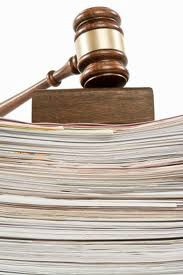The Libertarian Case for Judicial Transparency
Download this spoken discourse. – Download this article.
By: Shane Radliff and Kyle Rearden [social title=”” subtitle=”” link=”www.thelastbastille.com” icon=”fa-bitcoin”]
February 8th, 2016
“It is the lawyers who run our civilization for us — our governments, our business, our private lives. Most legislators are lawyers; they make our laws. Most presidents, governors, commissioners, along with their advisers and brain-trusters are lawyers; they administer our laws. All the judges are lawyers; they interpret and enforce our laws. There is no separation of powers where the lawyers are concerned. There is only a concentration of all government power — in the lawyers. As the schoolboy put it, ours is a government of lawyers, not men.”- Fred Rodell [Emphasis added]
 The 1787 United States Constitution is fraught with monopoly powers, one of them being the monopoly on adjudication services. When it comes to that monopoly, competence, and efficiency, disappear in a cloud of smoke, replaced by injustice. The already uneven playing field appears much worse, when you take into account that the lawyers (both, the prosecution and the defense), judges, and the bureaucrats are all on the same team. Secrecy, cover-ups, and “testilying” are part of the court’s modus operandi, hence, the importance for judicial transparency.
The 1787 United States Constitution is fraught with monopoly powers, one of them being the monopoly on adjudication services. When it comes to that monopoly, competence, and efficiency, disappear in a cloud of smoke, replaced by injustice. The already uneven playing field appears much worse, when you take into account that the lawyers (both, the prosecution and the defense), judges, and the bureaucrats are all on the same team. Secrecy, cover-ups, and “testilying” are part of the court’s modus operandi, hence, the importance for judicial transparency.
If you’ve visited the Liberty Under Attack website within the past six months or so, there’s a good chance you’ve seen the political prisoners tab, which contains the court documents for a number of defendants, both accused and convicted of “victimless crimes.” We’ve realized that there has been no explanation of our reasoning for putting that archive together, so the time has come to offer one.
First, I will explain “why” judicial transparency is important, as well as provide some examples of terrible judicial transparency that I have come across, which has motivated me to continue expanding the archive. Secondly, Kyle Rearden will tell you “how” to provide judicial transparency, whether it be for yourself, or for someone else. He will also explain the archiving system that we have utilized, which is the best we have been able to come up with thus far.
Why Should Libertarians Care About Judicial Transparency?
About the same time the political prisoners archive was conceived, I was just beginning my circuit of political field trips, which required me to read quite bit of Illinois law. One purpose for the political field trips, was to make the authoritarian activities of the local county government transparent to those who also happen to reside in Bloomington/Normal. That was the same time that I realized the importance of judicial transparency, which quickly led into the formulation of the aforementioned archive.
The initial political prisoners were particularly easy, as many of their cases had already been completed; these were, the Hutaree Militia, Darren Huff, Larry Myers, and Robert Beecher.
Then an old, now forgotten, darling of the patriot movement came to my attention. Enter, Charles Dyer.
When I first heard about his case, I was extremely motivated to obtain his court documents. That being said, judicial transparency was rather lax, as the only documents available were hosted on Scribd. There were a number of issues when it came to those documents. First off, there were only a handful of court documents available. Additionally, one of the documents in particular was missing a page. Lastly, some of the supposed “court documents” had just been transcribed into Microsoft Word documents, which removed all authenticity, thus making them absolutely useless for our purposes.
After I got everything useful off of Scribd, I contacted Dyer’s current girlfriend, Karyn Hardiman, and his mother, Janet Dyer. I was able to obtain a number of documents, but was unable to obtain the 3rd trial transcript, when he was convicted. After several months of fruitless back and forth with Hardiman, Dyer, and even a short exchange with none other than Nancy Genovese, it became obvious to me that I was getting nowhere fast, so I gave up on Dyer’s case.
That was my first encounter with the currently abhorrent practice of judicial transparency by “supporters” of these political prisoners, and it certainly left a deep impression upon me. With recalcitrant “supporters” like these, why worry about statism?
Another example is the case of Dwight and Steven Hammond. The Bundy Ranch blog posted a long exposé of their entire case, and of course, there was not a single court document available to verify the claims that they had made. To make matters worse, Ammon Bundy put up a YouTube video prior to the occupation of the Malheur Wildlife Refuge, where he showed a massive stack of court documents on camera. I was able to obtain a handful of court documents from the Internet, but no thanks to a man who thinks God wanted him to squat on a birdcage in Oregon.
Then, a couple of weeks into the occupation of the refuge, Pete Santilli made the “Hammond Legal Files” available for download on his website. I immediately downloaded them and took a look. The first thing I noticed in the 682 page PDF, was that the bulk of the documents were just letters to and from the Bureau of Land Management, the U.S Fish and Wildlife Service, and other governmental agencies. The second thing I noticed is that the first and last page were both documents from 1998. I continued perusing, eventually realizing that they were not in chronological order. Now, I understand that they were probably in a rush to make them available, so I’ll give them a little leeway there, but come on! For people who are “professionals” because this is how they make their livelihood, why would I be considered an “amateur” when I do a better job without expecting a paycheck in return? Considering the unorganized order of the documents, there is literally no way to “connect the dots.”
In summation, this was another encounter with lackadaisical judicial transparency, to say the least. Notice a pattern?
As you can see from the examples provided, there is a serious need for organized, easily accessible court documents. I can’t tell you how many times I’ve listened to the callers of other alternative media broadcasts who express a desire for such a user-friendly archive. We have tried to fill that void, but there are only a few of us, and the number of political prisoners increases quite a bit, considering that America is a police state.
So, why is there a necessity for judicial transparency?
First off, without knowing what the government is saying, there is no way for the defendant to mount a legal defense. In light of the aforementioned examples, it is possible that better judicial transparency could have assisted them in the execution of their litigation strategies. Obviously, that’s not a guarantee, but it definitely wouldn’t have hurt. Additionally, if the government is lying or doing something illegal, such as under “color of law”, the way to discover (and prove) that is through the court documents. Lastly, consider the supporters of the various political prisoners. Without judicial transparency, they are essentially left in the dark, much like how Dyer’s supporters were for years (and still are, mainly because the transcript for the third trial is being censored by his own relatives). Being able to keep updated with the case can give them peace of mind, and if anyone is independent media or freelance journalists, they might be able to assist in mounting a defense.
Briefly put, the whole point of judicial transparency is to:
- Prove the existence of political prisoners within these United States, particularly as a symptom of the police state, and
- Demonstrate the consequences of the failure to practice good security culture, especially regarding the opportunity costs incurred by these political prisoners.
In summation, judicial transparency is crucial and the process of providing it is a skill everyone in the alternative media needs to learn. It’s not a difficult task, although it does take a bit of work and time. It’s not sensationalistic, but in this struggle for freedom, there are necessary mundane tasks; providing judicial transparency is certainly one of them.
How Can Libertarians Increase Judicial Transparency?
Now that you understand why judicial transparency is crucial to libertarians, let’s proceed to how to make the judiciary more transparent.
Sometimes, the rulings or orders of court cases have been uploaded to the Internet; it just becomes a matter of finding them. For example, the United States Supreme Court uploads the latest slip opinions and volumes 502 – 561 to their own website; otherwise, you’d need to check older cases on websites such as OpenJurist or the Legal Information Institute at the Cornell Law School. Unfortunately, it is rather common for district or appellate federal courts to have their case documents behind a paywall (usually PACER), unless the corporate media releases them for a story; thankfully, hacktivists such as Carl Malamud and the late Aaron Schwartz proved it was possible to emancipate federal court documents from behind the PACER paywall into the public domain.
Oddly enough (or perhaps not?), the Texas judiciary does not have as much of a paywall than the federal judiciary, considering the TAMES case search. For instance, you can use TAMES to locate all the court documents for a particular case in easily downloadable PDF format – here are all the documents for the infamous 2014 Zahher El-Ali v. State of Texas case involving civil asset forfeiture (spoiler! Mr. El-Ali will never get his pickup truck back, and the rest of us Texans have no property rights whatsoever – Judge Willett said so!). During two of my political fieldtrips last year, I discovered that the county and municipal governments each have what they call “records inquiry,” or “public inquiry system,” however, keep in mind that these court dockets are simply the court schedules and not the case documents themselves.
Once you’ve got the documents, it’s time to organize them in preparation for sharing them publicly. Most likely, you will have to re-label the PDF files into a format that works for you. What Shane has done with the political prisoners archive is to use the following format:
DATE – DOCUMENT TYPE (NAME OF CASE).PDF
The date is shown with the last two numbers for the year, then the month, followed by the day of the month; this is done so that when visitors to Liberty Under Attack download court documents, they are automatically arranged chronologically in whatever folder they decide to put them in. For example, a document appears as such:
“150417” means April 17th of 2015. You also know that this is the indictment for William Wolf’s case; obviously, “United States” could be shorted to “U.S.” but that is more of an aesthetic preference than anything else. Most importantly, you want to make sure that there is a hyperlink associated with a particular court document, so what this means is that you will have to upload the PDF file onto your own website, blog, or file-sharing account.
Whatever you do, do not use Scribd, because any documents uploaded to that horrible website require you to login first before you are able to download anything, which might as well be a paywall – the idea here is to make these court documents easily downloadable for the most casual Internet surfer.
As soon as the court document files are hosted and available for free download by anyone, then you need to promote those hyperlinks. One easy way of doing so is to record a short screencast vlog of you reading some of the document, uploading the video onto a video-sharing website, and then adding the hyperlink to the video description box; if the document’s hyperlink is too long, then you will need to first make a shortlink, and then put that shortlink in the video description box. Another way is to put together a webpage for a specific political prisoner and hyperlink all the documents for his case on that one page, add a picture of the prisoner so as to humanize him, create a shortlink for the entire page, and then record a vlog advertising for the entire page. Yet another way is to call-in to live-streaming podcasts and wind the conversation over to your political prisoner whom you want to promote, and then mention the shortlink for the entire page so that the listeners know where to go to see and get the court documents for themselves. You can also promote your assemblage of court documents through discussion forums, email lists, and even Fascistbook!
If any of the alleged “supporters” for these political prisoners truly cared about them, they would be pushing for judicial transparency instead of frittering away donations for legal defense fund scams, or signing fruitless petitions. Although there is nothing wrong with making FOIA requests, that is not usually the first move to make, unless the nature of the case forces you to deal with “national security” issues. Admittedly, Ian Bernard does a very good job uploading both court documents and trial footage onto Free Keene and its accompanying YouTube channel, but everything is scattered across multiple blog posts, and is not organized on an easy to locate webpage or playlist, such as the Free Keene Video Archival Court Footage, 2008 – 2014.
Ultimately, the truth of the matter is that the Internet allows common people to make government court documents publicly available nearly for free, or otherwise, at cost. The learning curve will be fairly short for you if you take this tutorial presented here seriously. If you are concerned about your individual privacy, then be sure to either learn how to use proxy servers in order to obfuscate your internet protocol (IP) address being traced back, or use a public WiFi spot, or use a “clean” computer from which to upload, or some combination of the aforementioned methods, but regardless, don’t let your fear of being discovered get in the way of you getting those documents up!
Conclusion
When it comes to the importance of judicial transparency, it can be summed up thusly: if the Denver Broncos have never looked at the playbook, they’re going to have a hard time winning football games. Just as with the cheesy metaphor, if “we” don’t know what the government is arguing in their own courtrooms, it’s going to be hard to try and get “our guys out of prison.” To provide another example, it’s much like a blind man entering a boxing ring—if he can’t see his opponent, then he can’t see the punches that he would need to dodge, at the very least.
The goal of judicial transparency, is to make public open-source intelligence about the government judiciary, so that American dissidents can make their own decisions, when it comes to avoiding incarceration, especially when considering the exorbitant amount of “victimless crime” laws. It is our hope that the alternative media will begin utilizing the system that we have explained previously, and adapting it for their own purposes, as they see fit.
For more great content like this, please consider donating to Liberty Under Attack, as today is our one year anniversary of launching LUA Radio. Alternatively, sign up for a free trial through Audible, receive a free audiobook, and help support us in the process. Lastly, make sure to sign up for LUA email updates.


Trackbacks/Pingbacks